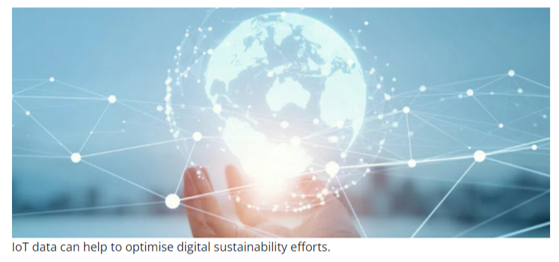K
Kathleen Martin
Guest
There’s no doubt that COP26 last November was a big wake-up call for organisations around the world. From requiring nations to disclose their zero emissions plans, to committing to make sustainable technologies more accessible and affordable within the next decade, it’s clear that companies will have to make a global effort to drive progress and strengthen climate action. There are many ways that the Internet of Things (IoT) can help them.
As a result of the pandemic, digital transformation accelerated dramatically, forcing businesses to adopt new technologies to achieve resilience, flexibility and maintain productivity. It’s hard to find a business that has survived without digitalising at least some of its processes over the past two years; and for many, it has been IoT that has proved to be essential. IoT helps to ensure continuity of operations and allows organisations to thrive in the future, even creating new revenue streams.
But digital transformation is now evolving and must not just focus on measuring and managing processes. It needs to focus on optimising them instead, to help companies reduce waste, costs, and improve time management. This is where IoT really comes to the forefront.
The critical differentiator
Now that there are fewer pandemic regulations, businesses are no longer in survival mode and can shift their attention to their future. In this landscape, IoT is a critical enabler delivering green impact. It has evolved from being a simple connectivity tool that keeps organisations going, to being a critical operational asset.
This bespoke solution can help to solve many challenges, including employee efficiency, customer experience, and improved adaptation. As an operational asset that can enable businesses to drive out waste through the improved supply chain, IoT can offer them the data needed to rapidly innovate to meet changing user demands and also enable them to provide customers with connected products and services. It can even make it possible for a company to extend its services into new markets and locations, enabling it to demonstrate compliance with local regulations.
Continue reading: https://www.information-age.com/how-iot-can-help-build-towards-future-improved-sustainability-123498804/
As a result of the pandemic, digital transformation accelerated dramatically, forcing businesses to adopt new technologies to achieve resilience, flexibility and maintain productivity. It’s hard to find a business that has survived without digitalising at least some of its processes over the past two years; and for many, it has been IoT that has proved to be essential. IoT helps to ensure continuity of operations and allows organisations to thrive in the future, even creating new revenue streams.
But digital transformation is now evolving and must not just focus on measuring and managing processes. It needs to focus on optimising them instead, to help companies reduce waste, costs, and improve time management. This is where IoT really comes to the forefront.
The critical differentiator
Now that there are fewer pandemic regulations, businesses are no longer in survival mode and can shift their attention to their future. In this landscape, IoT is a critical enabler delivering green impact. It has evolved from being a simple connectivity tool that keeps organisations going, to being a critical operational asset.
This bespoke solution can help to solve many challenges, including employee efficiency, customer experience, and improved adaptation. As an operational asset that can enable businesses to drive out waste through the improved supply chain, IoT can offer them the data needed to rapidly innovate to meet changing user demands and also enable them to provide customers with connected products and services. It can even make it possible for a company to extend its services into new markets and locations, enabling it to demonstrate compliance with local regulations.
Continue reading: https://www.information-age.com/how-iot-can-help-build-towards-future-improved-sustainability-123498804/

